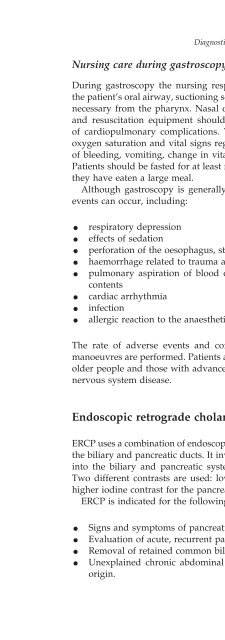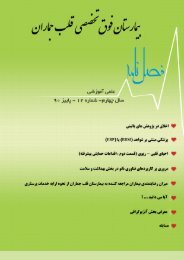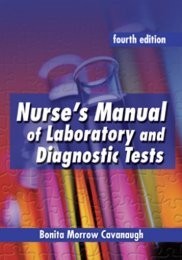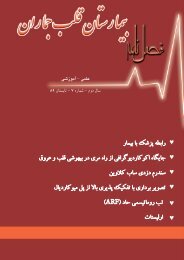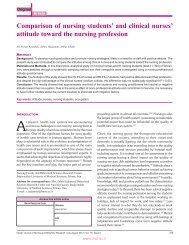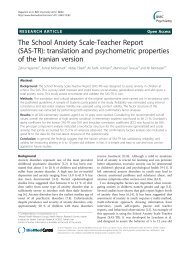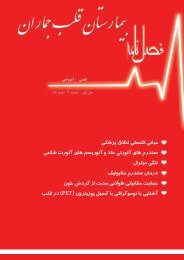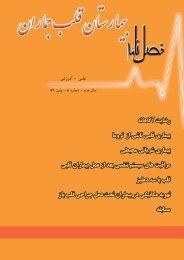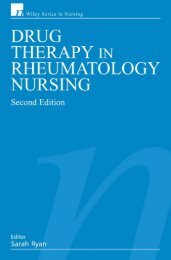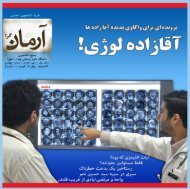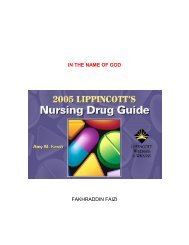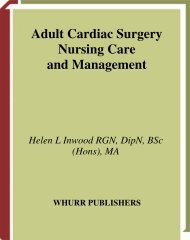- Page 1 and 2:
GastrointestinalNursingGraeme Smith
- Page 6:
Gastrointestinal NursingGraeme D Sm
- Page 10:
ContentsForewordvii1 Introduction 1
- Page 18:
Introduction 1Chapter 1Introduction
- Page 22:
Introduction 3Box 1.1Responsibiliti
- Page 26:
Introduction 5Box 1.6Post-procedura
- Page 30:
Introduction 7the fact that nursing
- Page 34:
Introduction 9Professional guidelin
- Page 38:
An Overview of the Gastrointestinal
- Page 42:
An Overview of the Gastrointestinal
- Page 46:
An Overview of the Gastrointestinal
- Page 50:
An Overview of the Gastrointestinal
- Page 54:
An Overview of the Gastrointestinal
- Page 58:
• excretion of waste products•
- Page 62:
An Overview of the Gastrointestinal
- Page 66:
The Oesophagus 25geal nerves to the
- Page 70:
The Oesophagus 27lower part of the
- Page 74:
The Oesophagus 29evidence to incrim
- Page 78:
The Oesophagus 31can mimic gastro-o
- Page 82:
The Oesophagus 33Management of acha
- Page 86:
The Oesophagus 35In patients with d
- Page 90:
The Oesophagus 37American College o
- Page 94:
The Stomach 39Figure 4.1 Anatomy of
- Page 98:
The Stomach 41pelled backward, coll
- Page 102:
The Stomach 43Figure 4.2 Summary of
- Page 106:
The Stomach 45duodenum. Ulcers in t
- Page 110:
The Stomach 47• age > 60 years•
- Page 114:
The Stomach 49The effectiveness of
- Page 118:
The Stomach 51Peptic ulcers are oft
- Page 122:
The Stomach 53In all patients it is
- Page 126:
The Stomach 55Resection offers the
- Page 130:
The Stomach 57McKenry, L.M. and Sal
- Page 134:
The Small Intestine 59The surface o
- Page 138:
The Small Intestine 61Blood supply
- Page 142:
The Small Intestine 63Between two a
- Page 148:
66 Chapter 5presentation and clinic
- Page 152:
68 Chapter 5that villous atrophy is
- Page 156:
70 Chapter 5is usually by the faeca
- Page 160:
72 Chapter 5Primary/secondary carci
- Page 164:
74 Chapter 5EVIDENCE-BASED GUIDELIN
- Page 168:
76 Chapter 6Figure 6.1 Arrangement
- Page 172:
78 Chapter 6the spinal nerves. Stim
- Page 176:
80 Chapter 6is caused by products o
- Page 180:
82 Chapter 6Non-neoplastic polyps m
- Page 184:
84 Chapter 6Intestinal obstructionC
- Page 188:
86 Chapter 6Since IBD tends to deve
- Page 192:
88 Chapter 6occurs at the first pre
- Page 196:
90 Chapter 6with five days of inten
- Page 200:
92 Chapter 6Table 6.2Crohn’s Dise
- Page 204:
94 Chapter 6prednisolone or methylp
- Page 208:
96 Chapter 6Surgical management of
- Page 212:
98 Chapter 6due to dysfunction of t
- Page 216:
100 Chapter 6with healthy volunteer
- Page 220:
102 Chapter 6Secondary prevention a
- Page 224:
104 Chapter 6are unknown and the ef
- Page 228:
106 Chapter 7Chapter 7The LiverChap
- Page 232:
108 Chapter 7PATHOPHYSIOLOGY OF THE
- Page 236:
110 Chapter 7Best practice guidelin
- Page 240:
112 Chapter 7Alcoholic hepatitisThi
- Page 244:
114 Chapter 7McKenry, L.M. and Sale
- Page 248: 116 Chapter 8Figure 8.1 Attachment
- Page 252: 118 Chapter 8antrum in response to
- Page 256: 120 Chapter 8Pigment stonesPigment
- Page 260: 122 Chapter 8Carcinoma of the extra
- Page 264: 124 Chapter 9Chapter 9The PancreasC
- Page 268: 126 Chapter 9Figure 9.2 Ducts of th
- Page 272: 128 Chapter 9These enzymes are rele
- Page 276: 130 Chapter 9Acute pancreatitisAcut
- Page 280: 132 Chapter 9Pancreatic cancerTumou
- Page 284: 134 Chapter 9
- Page 288: 136 Chapter 10
- Page 292: 138 Chapter 10the role of the nurse
- Page 296: 140 Chapter 10the optic system cons
- Page 302: Diagnostic Procedures and Tests in
- Page 306: Diagnostic Procedures and Tests in
- Page 310: Diagnostic Procedures and Tests in
- Page 314: Diagnostic Procedures and Tests in
- Page 318: Gastrointestinal Emergencies 151Cha
- Page 322: Gastrointestinal Emergencies 153Box
- Page 326: Investigations for lower gastrointe
- Page 330: Gastrointestinal Emergencies 157BAC
- Page 334: Pharmacology in Gastroenterology 15
- Page 338: Pharmacology in Gastroenterology 16
- Page 342: Pharmacology in Gastroenterology 16
- Page 346: The Role of Psychosocial Factors in
- Page 350:
The Role of Psychosocial Factors in
- Page 354:
Inflammatory bowel diseaseThe Role
- Page 358:
Stressful life events leading to on
- Page 362:
The Role of Psychosocial Factors in
- Page 366:
The Role of Psychosocial Factors in
- Page 370:
The Role of Psychosocial Factors in
- Page 374:
Quality of Life in Gastroenterology
- Page 378:
Quality of Life in Gastroenterology
- Page 382:
Quality of Life in Gastroenterology
- Page 386:
Quality of Life in Gastroenterology
- Page 390:
Quality of Life in Gastroenterology
- Page 394:
Glossaryachalasia - a motor disorde
- Page 398:
hepatocyte - a liver cell.hepatoma
- Page 402:
Useful AddressesLocal addresses are
- Page 406:
Irritable Bowel Syndrome NetworkNor
- Page 410:
Code of Professional Conduct 197•
- Page 414:
Code of Professional Conduct 1993.9
- Page 418:
Code of Professional Conduct 201com
- Page 422:
Code of Professional Conduct 203ava
- Page 428:
206 Indexgall bladder, 115-23anatom
- Page 432:
208 Index
- Page 436:
Plate 5 (top left)Endoscopicappeara


